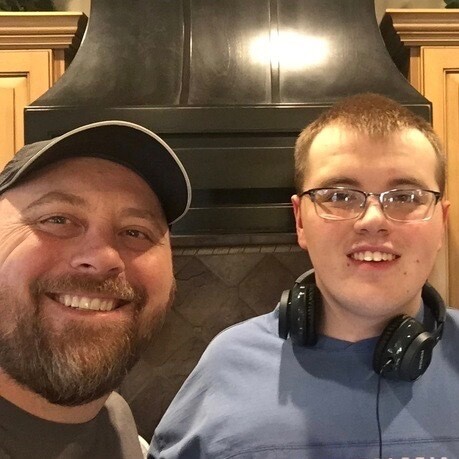I have a sweet 20-year-old son who has low-functioning autism. Two years ago, when many of the boys from our ward near his age were opening their mission calls, I remember attending one "letter opening" with mixed emotions.
If my son were normal, he'd be opening his call right now, I thought.
That thought felt heavy. It was almost grief—a sadness at what would never be.
Now, I am past the point of comparing my kiddo to others for the most part. But every once in a while when other boys Nathan’s age are hitting a big milestone, like opening a mission call, the comparison bug bites me.
As I sat there beside Nathan watching the other young man open his call, the Spirit whispered, "Nathan has his own mission in mortality."
Grief was dispelled as peace flooded into me and my eyes filled with tears. Heavenly Father was aware my mama heart was a little heavy that day, and He reassured me my son had a mission all his own.
Here are some lessons I re-learned that day:
1. It is unfair to compare and covet.
“When we compare ourselves to one another, we will always feel inadequate or resentful of others.” –Sister Bonnie S. Oscarson, “Sisterhood: Oh, How We Need Each Other”
Comparing what others have to what we don’t—to the point where we are unhappy they have it and we don’t—is coveting.
Why would coveting be so important God listed it as one of the Ten Commandments? A few years ago, I looked up all the references of the word “covet” in the scriptures because I wanted to understand this concept a little better. I originally thought jealousy and ingratitude were at the root of coveting, but my study of the scriptures pointed me in another direction: Love.
You can summarize the first four of the Ten Commandments by saying, “Love God.” The second half of the Ten Commandments (including coveting) can be summarized by saying, “Thou shalt love thy neighbor as thyself” (Romans 13:9).
Now, I had heard “love thy neighbor as thyself” many, many times throughout my life, but I guess I had never put two and two together: First, I had to learn to love God and, as I did that, I would love myself; and second, once I loved myself, it would then help me truly love my neighbor and not covet their children, their home, or anything else.
Obviously, this concept of learning not to compare and covet is much easier to talk about than it is to live. In my situation, I watched other families going on walks, or to the store, or sitting quietly in church, or opening mission calls, and I really envied them. I wanted what they had (what I perceived as “normal” kids), and because I wanted it so badly and compared myself to them so much, I was quite unhappy with my own situation.
Ultimately, I think it requires God’s help to make this change. So, I prayed for the strength to change,and then worked with God day after day until He changed my heart to love Him, myself, and others more purely, without coveting and comparing.
2. Each person has a unique mission.
“This is the work of God. We are all His servants. He is watching over us. He wants us to succeed. We all have some part of the holy work to accomplish, even though it may seem small and obscure.” –James E. Faust, “Your Light—A Standard to the Nations”
Each person on earth has a unique mission they are called to serve. This includes my sweet Nathan. I believe part of Nathan’s mission in mortality is to teach me and help me become a better, more patient and kind mother.
I love the quote by President Russell M. Nelson when he said:
“For reasons usually unknown, some people are born with physical limitations. . . . “A perfect body is not required to achieve a divine destiny. In fact, some of the sweetest spirits are housed in frail frames. Great spiritual strength is often developed by those with physical challenges precisely because they are challenged. Such individuals are entitled to all the blessings that God has in store for His faithful and obedient children” ("We Are Children of God," Ensign, Nov. 1998, 86–87).
Isn’t it wonderful to know God knows each of us and has a mission for each of his sons and daughters to fulfill? Due to our unique gifts and talents, those missions in life will differ for each of us. And that is as it should be.
We will each receive callings that will help us develop talents and give us opportunities to share our gifts and skills. We will each go through trials that make us stronger and more empathetic to others.
Some of us will serve full-time missions, and some will serve service missions. Some will serve in our home wards, and some of us, like my Nathan, will teach others to love by being served. The cycle of service is a cycle of love because we learn to love those we serve and those who serve us.
I testify God knows and loves each of us and He wants to help each of us reach our full potential. We each have a mission here on earth.
3. Heavenly Father is aware of our heavy hearts.
“Your Heavenly Father—who knows when even a sparrow falls—knows of your heartache and suffering.”—Elder Joseph B. Wirthlin, “Finding a Safe Harbor”
I love the story in the New Testament of the Savior sleeping through a storm on the sea and His disciples awakening Him by saying, “Master, carest thou not that we perish?” (Mark 4:38).
There have been points in my life when I really felt like God was sleeping, but the truth of the matter is, Heavenly Father is always watchful. He watches us in good times and bad. He mourns when we mourn and sends peace when we need it—just like I needed it that day of the mission call opening.
In our time of trial, He is there saying, “Peace, be still” (Mark 4:39). We need to learn to listen to the voice of the Master when He speaks to us and put ourselves in places where we can feel the Spirit whisper.
Conclusion
One of my favorite quotes by President Thomas S. Monson says:
“Remember that this work is not yours and mine alone. It is the Lord’s work, and when we are on the Lord’s errand, we are entitled to the Lord’s help. Remember that the Lord will shape the back to bear the burden placed upon it” (“To Learn, To Do, To Be”).
As a mother, I am on the Lord’s errand. Part of my errand includes raising four children (two of whom have autism), and I have needed His help throughout this assignment and mission. I am thankful for the lessons I re-learned from that sweet experience at the opening of a mission call a few years ago.
I am thankful to have been reminded it is unfair to compare and covet, each person has a unique mission, and Heavenly Father is aware when we have heavy hearts and is ready and willing to pour out peace.
May we remember these lessons in times of discouragement and be ready and willing to assist wherever and however we are called to serve in our missions in mortality.
Lead image courtesy of Tamara K. Anderson
Tamara K. Anderson loves reading stories with happy endings, conducting choirs, and juggling the activities of her four children. She is the mother of three sons (two of whom are on the autism spectrum) and one daughter. Raising her brood is a full-time job! She has lived in the east, south, and west of the United States and even in Argentina for three years as a young girl. Tamara enjoys podcasting, gardening, writing, singing, chocolate, and going on dates with her husband, Justin. You can find her on her website, tamarakanderson.com
Get her new book, Normal for Me, on Amazon or at DeseretBook.com.




